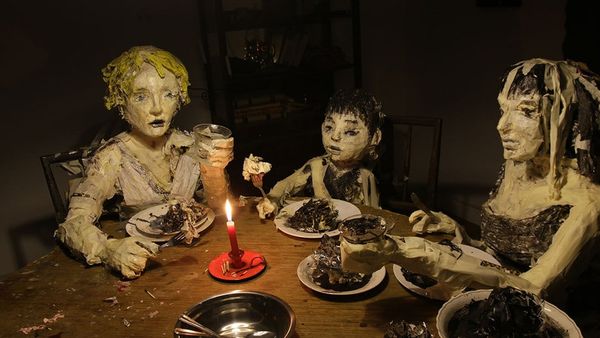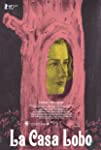Eye For Film >> Movies >> The Wolf House (2018) Film Review
The Wolf House
Reviewed by: Jennie Kermode

Imagine living in the perfect little community, deep in the heart of Chile, where the people living in beautiful little houses and wear old fashioned clothes and work together for the betterment of all - where it's peaceful and safe and everybody knows that they belong. The advertising that opens Chile's 2021 Oscar submission is very close to the genuine article as produced by the media department of Colonia Dignidad, the wire-fenced village run between 1961 and 2007 by former Nazis who helped Pinochet's regime to torture and detain prisoners and, thanks to the powerful friends this bought them, spent a long time able to get away with pretty much anything they liked, up to and including importing German orphans whom they sexually abused. Over the years, despite the wire and the warfare, a handful of villagers escaped. This is the fictionalised story of one of them.
When a subject is too horrific to look at directly, or when there is a need to spread awareness of a danger it is difficult to speak of, a number of devices can be brought into play: allegory, abstraction, animation, folkloric tradition. Joaquín Cociña and Cristóbal León weave all of these together in a film which deserves to win every animation award going in 2021. Amalia Kassai plays María, a girl who rescues two pigs from slaughter and hides away with them in a mysterious house deep in the forest. Rainer Krause is the wolf at the door, huffing and puffing. To survive, the girl must outwit him not once but again and again, whilst fending off a more insidious foe: her own growing understanding of the world.

With most of its 75 minute runtime comprised of stop motion animation, The Wolf House represents an astonishing amount of work. It is consistently inventive, switching styles again and again,. and although the story is sometimes incoherent, it never ceases to be visually arresting. As years go by, the little pigs change and grow, shifting in form as María comes to identify them as her children, giving them names and trying to teach them to behave accordingly. The house, which itself seems possessed of some organic quality and provides them with uncertain sustenance, also changes, its furniture, decorations and internal structure rearranging themselves in accordance with the girl's whims. Perhaps this is all an expression of solitude and madness, but nevertheless, it provides a bulwark against savage reality - as long as she can keep believing in it.
Despite its disturbing background and the constant sense of encroaching darkness, The Wolf House has a certain charm, with elements of humour and affection between some of its characters. The creepiest thing about it is the narration, delivered from the perspective of one of the colony's leaders, positioned as a warning about the dangers of leaving it. Even viewers who don't know its history should be able to pick up on the innate untrustworthiness of this. Its tourist brochure tone gives events an absurd cast which provides important moments of levity in the otherwise foreboding tale.
An astonishingly detailed, lovingly assembled piece of work which confronts one of the darkest episodes in Chile's troubled history, this is a film you will never forget.
Reviewed on: 13 Jan 2021















